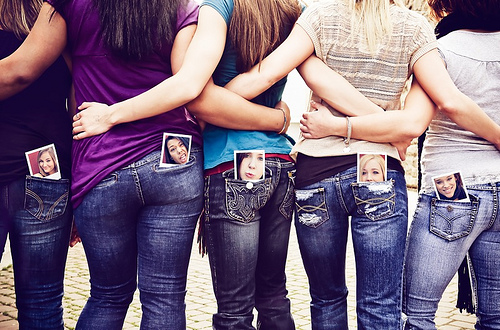You’ve giggle, bawled and partied together, but what
happens to your friendships when babies and mortgages get thrown into the mix?
Clementine Bastow finds out…

It’s a known fact that, throughout the
universe, there’s a simple phrase that can be employed to gauge the distance
between any group of friends’s realities: “Let’s just split the bill evenly.”
Drop that sentence at the dinner table in any group of female friends around
the age of 30 and you’re likely to get a whole rainbow of reactions.
Jill, who has worked her way up at the law
firm she joined after her gradutating, is first to dive into her wallet.
Rachel, a primary school teacher, who’s just taken on a mortgage, is a little
slower to fish out a $20 note. Karen, who is currently “clean eating” with her
husband and only ordereds a miso, frowns. And Claire, a part-time copy-writer
with a one-year-old child, had only really intended to spend $15 and isn’t sure
how to bring it up.
Of course, it isn’t solely money that sets
us apart from our friends, but what happens when you look around the table and wonder,
if we had to stop talking about the “good old days”, or what happened on True
Blood that week, would we still actually have anything in common?
When long-held friendships begin to drift
apart it can be painful. Realising that friends you once shared everything with
are having distinctly different experiences to you is a shock. We start to give
ourselves the third degree: how did they make it happen? Am I doing something
wrong? Can we still be friends if our lives might as well be happening in different
universes?
“When I approached 30, I felt very strongly
that I was moving into a different stage of my life,” says Elizabeth, 31, who
moved from Brisbane to Sydney last year for love, and to pursue career
opportunities. “I started noticing that my younger friends were caught up in
ticking of boxes of their to-do lists that I had either been there and done, or
had no interest in doing.”
Or put a baby in the mix and the
differences between friends’ worlds can become starkly apparent.
“Many of my friends aren’t any where near
having kids yet,” says Tina, 32, whose daughter is nearly one. “Becoming a
parent doesn’t mean you completely lose touch with your previous life. I need
to live vicariously through my single friends and hear about their fabulous social
lives!” she laughs.
When we form friendship groups in our
teenage years or 20s, it tends to be because we’re all on the same page;
whether at school or university, we bond over shared dreams and circumstances.
Maybe we’re all going to grow up and start businesses, or win Oscars, or write
books, sticking together as one of those “power” groups of old friends that
reporters write glowing, awed feature articles about. Consequently, it can be
difficult to accept when members of the friendship group start to move away
from those seemingly shared goals.
“I really value my career,” says Sarah, 31,
who has carved herself a niche in the marketing world. “When I get together
with my old friends, I feel like they see me as this workaholic maniac. They’ve
chosen to focus more on things like family and relationships, and see their
jobs as a means to an end. Sometimes, I wish they’d see I’m passionate about my
job and let me share that enthusiasm with them.”
Hence, it’s not unsual to find yourself
drifting away from friendships formed years previously, and towards newer
friends with whom you have more in common. I noticed quite a few of my friends
were heading in the direction of having babies, and I think I’ve become a lot
closer to them since becoming a mum,” says Tina. “We are going through this
huge new life stage at the same time, so we can better understand what we’re
all going through. It helps that we have similar schedules, too; not a lot of
opportunity to go out at night, but plenty of time to catch up during
weekdays.”
As we’ve navigated our 20s and beyond, my
oldest friends and I have subtly ended up in different places; there have been
marriages, babies, career successes and home owner-ships. Some of us have naged
to tick off all of those milestones, while some have taken much more of a
pick’and’mix approach – I know I have.
When I was 24, I went to see a fortune
teller, Tara. She had a stall at a local market – think saris and mystical
looking scarves pinned up inside a rent-a-tent – and for $25, offered to tell
my fortune. I crossed her palm with plastic and she set about reading my palm
and then my tarot spread.
What began as a bit of fun led quickly to
my sitting transfixed as Tara, who apparently knew everything about me, from my
two abandoned university courses to my brother’s love of the drums, gave it to
me straight: things are a bit all over the shop right now, but just wait until
you’re 30. That’s when everything – work, life, relationship and babies – is
going to happen.
Given the uncanny accuracy of the rest of
the reading. I had no reason to doubt the veracity of her soothsaying, and so
swanned out of the rent-a-tent safe in the knowledge that everything was all
going to work out.